In the dynamic realm of technology and information, equipping oneself with the right tools is paramount, and for computer science students, a reliable laptop is the linchpin of academic success.
The quest for the “best laptop for computer science students” transcends mere hardware specifications; it delves into a fusion of performance, portability, and versatility.
As these budding technologists navigate the intricate landscapes of coding, programming, and resource-intensive tasks, the ideal laptop becomes an indispensable companion, propelling them toward innovation and efficiency.
In this exploration of the optimal computing companion for computer science scholars, we dissect the features and functionalities that elevate certain laptops to the forefront, ensuring that these students can seamlessly translate their intellectual prowess into tangible, groundbreaking achievements.
Best Laptop For Computer Science Students
Selecting the best laptop for computer science students is a crucial decision that directly impacts their academic journey. The ideal laptop for these students goes beyond mere processing power, extending into factors like programming efficiency, multitasking capabilities, and portability.
A balance between performance and versatility is key, accommodating the diverse range of tasks from coding and software development to data analysis.
As technology rapidly evolves, a forward-thinking laptop equipped with ample RAM, a robust processor, and a comfortable keyboard can significantly enhance a student’s ability to navigate the complexities of computer science coursework.
In this fast-paced field, the right laptop becomes an indispensable tool, empowering students to code, innovate, and collaborate seamlessly.
1. Gateway Ultra Slim Notebook
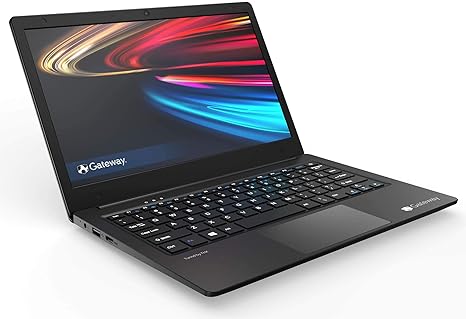
The Gateway 14.1-inch Ultra Slim Notebook is a sleek and portable device designed for users, including computer science students, seeking a reliable and affordable laptop.
Its standout features make it a noteworthy choice.
Display
The laptop boasts a 14.1-inch LCD IPS display with a sharp 1920 x 1080 resolution, providing vibrant visuals. The display, tuned by THX Audio, ensures an immersive experience, making it suitable for tasks ranging from coding to multimedia consumption.
Processor, Storage, and RAM
Powered by the Intel Celeron Processor N4020, this laptop offers a balance of performance and efficiency. With 4GB of DDR4 RAM, multitasking is smooth. The 64GB high-speed eMMc storage, expandable via a Micro SD slot, provides adequate space for essential files and projects.
Battery, Keyboard, Webcam, Ports
While specific battery details aren’t mentioned, the ultra-slim design suggests it’s optimized for on-the-go use. It should offer decent battery life for a student’s daily tasks.
The laptop features a standard keyboard, crucial for comfortable typing during long coding sessions. The 1MP webcam facilitates online classes and video conferencing.
It comes equipped with essential ports, including Mini HDMI, USB 2.0, USB 3.0, and USB Type-C for versatile connectivity.
PROS
- Ultra-slim and lightweight
- High-resolution IPS display
- Tuned by THX Audio
- Enhanced security features
- 1MP webcam facilitates online classes
CONS
- Limited Storage 64GB
2. SAMSUNG Galaxy Book3 Pro
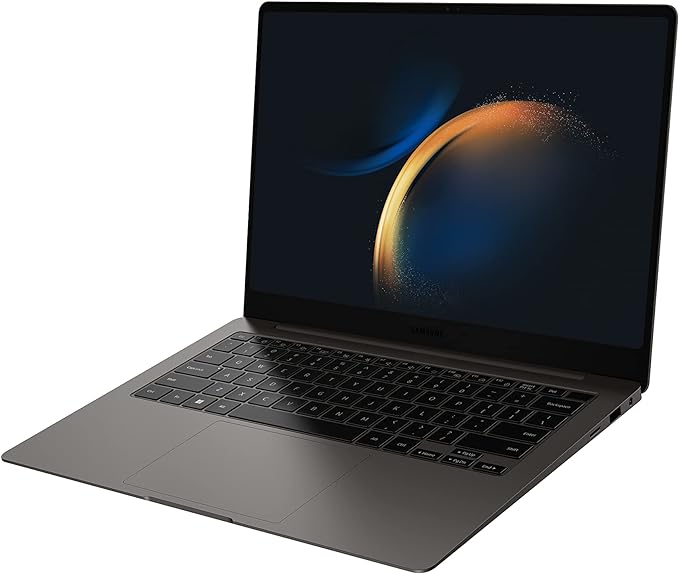
The Samsung 14″ Galaxy Book3 Pro is a powerful business laptop, ideal for computer science students seeking top-notch performance.
Display and Processor
The laptop boasts a stunning 16:10 AMOLED display, providing a crisp viewing experience. Powered by the 13th-gen Intel Core i5-1340P processor, it ensures speedy performance, catering to the demanding tasks of computer science projects and coding.
Storage and RAM
With a substantial 16GB RAM, multitasking becomes seamless and crucial for running resource-intensive applications. The 512GB storage capacity provides ample space for files and software, accommodating the needs of computer science students.
Battery, Display, Ports
The laptop excels in battery life, enabling productivity throughout the day. Notably, a 40% charge can be achieved in just 30 minutes, ensuring minimal disruptions to your workflow.
The 120Hz refresh rate on the AMOLED screen ensures smooth scrolling, enhancing user experience. The Eye Care Display feature reduces blue light, promoting eye comfort during extended usage.
Designed for versatility, the laptop allows seamless connectivity with other Galaxy devices, expanding work possibilities. It includes essential ports for varied needs.
PROS
- 13th-gen Intel Core processor
- 16:10 AMOLED screen
- Fast 120Hz refresh rate
- 16GB RAM
- 512GB storage capacity
CONS
- Premium features come with a higher cost.
3. ASUS laptop for Student
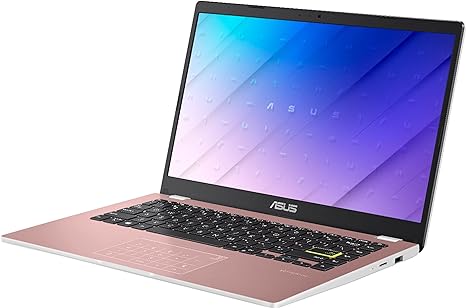
The ASUS 14″ Thin Light Business Student Laptop is a stylish and efficient device, well-suited for the needs of computer science students.
Display and Processor
Featuring a 14″ HD display with NanoEdge technology, this laptop offers a clear visual experience with a narrow bezel design for enhanced focus. The Dual Core Intel Celeron N4020 processor, with a 2.80GHz burst frequency, provides efficient performance for daily tasks and studies.
Storage and RAM
With 4GB of high-bandwidth DDR4 RAM and 64GB storage, this laptop ensures smooth multitasking and ample space for essential applications. The combination of memory and storage promotes work efficiency for computer science students.
Battery, Design and Webcam
Boasting an impressive 12+ hours of battery life, the laptop supports prolonged usage without the need for frequent recharging. This extended battery life is particularly beneficial for students with demanding schedules.
The laptop’s rose gold color adds a touch of elegance, making it an attractive choice for students. The integrated webcam is suitable for Zoom meetings and online classes, facilitating seamless communication.
Operating System and Ports
Running on Windows 11 Home, the laptop provides a modern and user-friendly interface. Its narrow bezel design is complemented by various ports for versatile connectivity.
PROS
- Thin and light design
- Appealing rose gold colour
- Intel Celeron N4020
- Long Battery Life
- Modern operating system
CONS
- Limited Storage 64GB might be constraining for users with large storage needs.
4. HP Laptop for Student
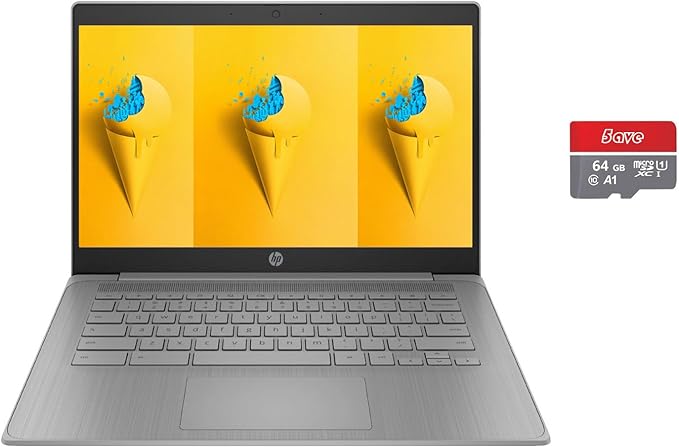
The HP HD 14″ Chromebook is a reliable and affordable choice for computer science students, offering a balance of performance and versatility.
Display and Processor
The 14-inch high-definition display provides crisp visuals for work and entertainment. Powered by the Intel Celeron N4120 processor, this Chromebook ensures reliable performance for everyday tasks, making it suitable for the demands of computer science studies.
Storage and RAM
With 4GB RAM and 128GB storage (64GB eMMC + 64GB Flash Memory), this Chromebook offers ample memory and storage space. It’s designed to handle files, documents, and multimedia content, providing flexibility for a student’s needs.
Battery, Chrome OS and Ports
The Chromebook is equipped with a long-lasting battery, ensuring extended productivity without frequent charging. Running on Chrome OS, it delivers a fast, secure, and user-friendly experience, complemented by seamless integration with Google apps.
Stay connected on the go with Wi-Fi and Bluetooth capabilities. The HDMI port allows for easy connection to external displays or projectors, enhancing versatility for presentations or extended-screen real estate.
PROS
- A budget-friendly option for students
- Ample Storage 128GB
- Wi-Fi, Bluetooth, and HDMI port
- The HDMI port allows
- Intel Celeron N4120 processor
CONS
- Limited RAM 4GB
5. Flex 3 Chromebook
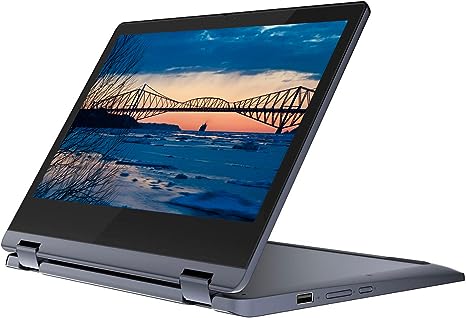
The Flex 3 Chromebook by Lenovo, in vibrant Blue colour, is a versatile 2-in-1 touchscreen laptop tailored for computer science students.
Display and Processor
The 11.6-inch HD touchscreen offers an interactive experience. Powered by the MediaTek MT8183, an 8-core processor with a base clock of 1.6GHz (boosting up to 2.0GHz), it ensures efficient multitasking, suitable for coding and daily tasks.
Storage and RAM
With 4GB RAM, upgraded for full-power multitasking, and 128GB storage (64GB SSD + 64GB Card), this Chromebook provides ample space for files. The SSD enhances speed, while the extra card storage is a bonus for digital content.
Battery, Connectivity and Design
Battery life details aren’t specified, but as a Chromebook, it typically offers a decent runtime. Connectivity includes USB-C, USB Type-A, HDMI, and a Micro SD Card Reader, ensuring versatility for various peripherals.
The 2-in-1 design allows flexible usage. It features a webcam with a microphone, essential for online classes, and comes bundled with a ROKC Stylus Pen for added functionality.
PROS
- Upgraded RAM 4GB
- Ample Storage 128GB SSD
- Inclusive Stylus Pen
- The 2-in-1 design allows
- USB-C, USB Type-A, HDMI
- The 11.6-inch HD touchscreen
CONS
- Limited Processing Power
6. SAMSUNG Galaxy Book2 Pro
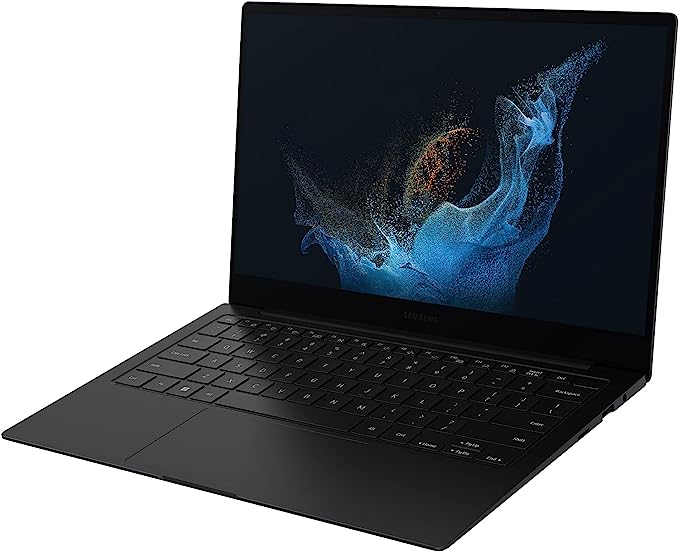
The Samsung Galaxy Book2 Pro 15.6″ i7/16G/512G in Graphite is a powerhouse laptop tailored for the needs of computer science students.
Display and Processor
The laptop boasts a stunning 15.6-inch AMOLED screen with a 1MM:1 contrast ratio, adapting to any lighting environment. Powered by a 12th Gen Evo-certified Intel Core i7 processor, with speeds ranging from 2.10GHz to a turbo-boosted 4.60GHz, it ensures a smooth and powerful computing experience.
Storage, RAM and Battery
With a generous 16GB RAM, multitasking becomes effortless, and the substantial 512GB storage allows for ample space to store large files, software, and projects.
The Galaxy Book2 Pro features an impressive battery life, keeping you productive for hours. Additionally, the universal fast charger provides a 40% boost in just 30 minutes, ensuring minimal downtime.
Design, Webcam and Ports
Weighing less than 2 pounds, it’s remarkably thin and light. The laptop features an upgraded full HD camera with a 1080p wide-angle view, enhancing your video conferencing experience.
The laptop is equipped with versatile ports and features a 360° hinge for a 2-in-1 design. It also includes an S Pen for a tablet-like experience. The Windows 11 Home operating system enhances productivity.
PROS
- 12th Gen i7 processor
- Long Battery Life
- Fast Charging 40% in 30 minutes
- Weighing less than 2 pounds
- 16GB RAM and 512GB
CONS
- Premium features come with a higher cost
Conclusion
Selecting the best laptop for computer science students requires careful consideration of performance, storage, display quality, and portability. Each of the laptops discussed presents unique features catering to the diverse needs of computer science studies.
The ASUS E410 offers affordability and efficiency for students on a budget, while the Flex 3 Chromebook by Lenovo provides versatility with its 2-in-1 design. For those seeking premium performance, the Samsung Galaxy Book2 Pro with its powerful Intel Core i7 processor and AMOLED display stands out as a top-tier choice.
Ultimately, the best laptop depends on individual preferences, budget constraints, and the specific requirements of the computer science curriculum.
Whether it’s a balance of affordability and functionality or a premium device with cutting-edge features, the laptops discussed provide options to suit various preferences within the realm of computer science studies.
FAQs
Which HP laptop is best for computer science students?
HP Spectre x360 and HP Envy series are good options for computer science students, offering a balance of performance and portability.
Is i5 good for computer science?
Yes, an Intel Core i5 processor is generally sufficient for computer science tasks. However, an i7 may offer better performance for demanding workloads.
What are the laptop requirements for computer science students?
Computer science students need a laptop with a fast processor (i5 or i7), at least 8GB of RAM, a good storage solution (SSD recommended), and a comfortable keyboard.
Is i5 or i7 better for computer science?
Both i5 and i7 processors are suitable for computer science. An i7 may be better for tasks like programming and simulations that demand higher processing power.
Which company is best for a laptop?
Brands like Dell, HP, Lenovo, and Apple offer good laptops for different needs. The choice depends on individual preferences and budget.
Is a laptop necessary for CS students?
While not strictly necessary, a laptop is highly recommended for computer science students for programming, research, and coding projects on the go.
What do you need in a laptop for computer science?
For computer science, you need a laptop with a fast processor (i5 or i7), at least 8GB of RAM, a reliable SSD, and a comfortable keyboard for coding tasks.
Related post: